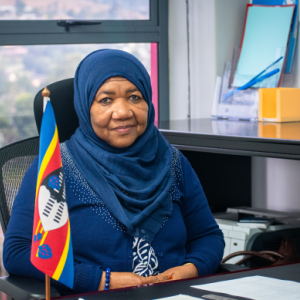Your Excellencies; the Rt. Hon. Prime Minister,
Hon. Minister of Health,
Cabinet Ministers,
Regional Administrator,
Diplomatic Corps,
Civil Society,
Government officials,
Media,
Programme Directors,
Our brothers and sisters living with HIV,
Ladies and gentlemen,
It is an honour to be here today to commemorate World AIDS Day with you all. Each year, on 1st December, the world pauses to reflect and honour the brave, courageous and resilient persons living with HIV and AIDS around the world, as well as the precious lives lost to the AIDS pandemic.
This year’s commemoration is unique in that we share this occasion at a time of colliding pandemics. The COVID-19 pandemic has laid bare the immense, deep and extensive inequalities that exist today, impacting the global economy and healthcare systems in undeniable ways. The pandemic has rattled healthcare systems, shaking the most sophisticated of all, and exposing the lack of preparatory measures in place.
However, prior to the outbreak of the devastating coronavirus, nations across the world had made incredible progress in the fight to eradicate HIV and AIDS, including our Kingdom of Eswatini.
On behalf of the UN family in Eswatini, I would like to congratulate the Government, civil society, NGOs and all Emaswati for achieving the 95-95-95 targets, and impressively, maintaining this target throughout 2020.
We cannot afford to lose this momentum as AIDS remains a pandemic of great concern; such which its impact has deepened during the COVID-19 era. With the emergence of a new COVID-19 variant; Omicron, we must double our efforts to protect Emaswati from both pandemics, ensuring that HIV prevention, treatment and care services are disrupted no further.
Ladies and gentlemen, we can end AIDS by 2030 if we take bold actions together, now. Addressing inequalities is critical in ending AIDS and preventing future pandemics, and this must remain a priority as we seek to build back better.
It is only in solidarity that we will see transformative change in our Eswatini. The United Nations Sustainable Development Cooperation Framework (UNSDCF) 2021-2025, provides a blueprint to achieve the Sustainable Development Goals, using evidence-based approaches, with a focus on eradicating AIDS.
However, adaptability, agility and quick-thinking are required to ensure that the evolving COVID-19 pandemic does not undermine global efforts to end AIDS by 2030. We need to act immediately, with courage and in line with five critical elements outlined in the global AIDS Strategy:
- community-led and community-based infrastructure
- organizations of affected communities must be treated as full partners – involved in pandemic responses
- equitable access to medicines
- health technologies should be available to all
- supporting workers on the pandemic front lines
- health worker shortages undermine pandemic response
- human rights at the centre of pandemic responses
- addressing discrimination in health care that drives people away from services
- people-centred data systems that highlight inequalities
- using sub-national data to zero in on service gaps.
We must continue to revisit our strategies to reverse the alarming trend of new HIV infections, particularly among 15–24-year-old adolescent girls and young women. HIV prevention remains our most important tool in the fight against AIDS, using improved community-led HIV prevention interventions. HIV treatment, although more affordable today, needs immediate, full funding to ensure an efficient HIV response in Eswatini.
Ladies and gentlemen, as we commemorate World AIDS Day during the 16 Days of Activism Against Gender-Based Violence, might we acknowledge the devastating impact that gender-based violence (GBV) has on our women and girls – those who are most vulnerable to GBV. A clear link exists between GBV and HIV infection, with abused women more likely to contract HIV of 1 in 3 EmaSwati females experience some form of sexual abuse by the age of 18. We cannot have a “just, prosperous and resilient Eswatini where nobody is left behind” if GBV continues to devastate lives, particularly those of women and girls.
On behalf of the United Nations Family in Eswatini, our sincere gratitude is extended to the Government, our partners and all local and international organizations which have contributed towards the fight against HIV and AIDS in Eswatini. We hugely value your partnership as we seek to grow local, community-level capacity to implement and coordinate the country’s HIV and AIDS response.
The United Nations is deeply committed to the people of Eswatini and our fight to end AIDS by 2030. As I close, I implore partners and EmaSwati to stand firm, with courage and determination, to end AIDS for-good. In solidarity, we shall see a better Eswatini for all.
I thank you.




